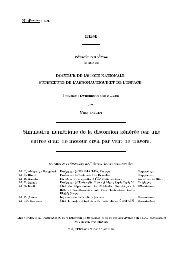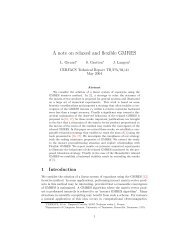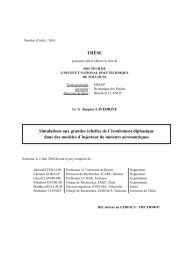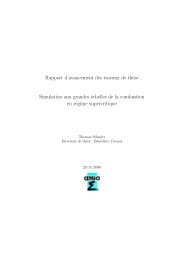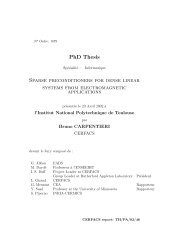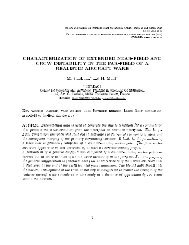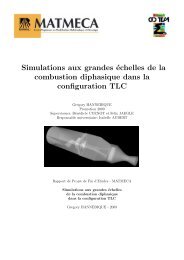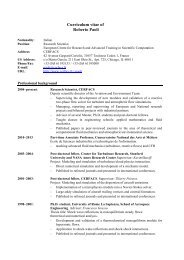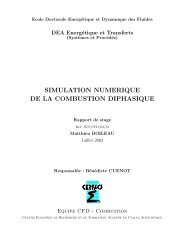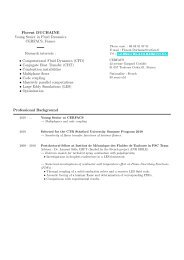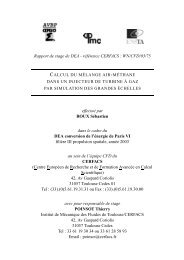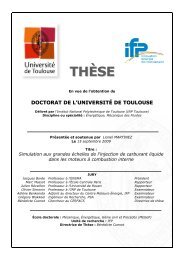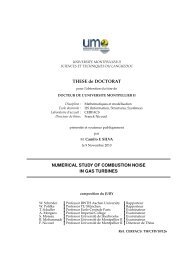CERFACS CERFACS Scientific Activity Report Jan. 2010 â Dec. 2011
CERFACS CERFACS Scientific Activity Report Jan. 2010 â Dec. 2011
CERFACS CERFACS Scientific Activity Report Jan. 2010 â Dec. 2011
You also want an ePaper? Increase the reach of your titles
YUMPU automatically turns print PDFs into web optimized ePapers that Google loves.
2 Climate variability and predictability<br />
The weather/climate system exhibits considerable variability on a wide range of spatial and temporal scales.<br />
Those are characterized by strong interactions that must be taken into account to better understand and<br />
predict the atmosphere from daily variability to climate change. Interest in weather/climate fluctuations<br />
have been rapidly growing over the last few years following the recent recurrence of extremes and the<br />
more pressing evidence for anthropogenic influences on climate. In such a context covering a large<br />
spatio-temporal spectrum, demand for predictability of weather/climate variability over the next decades<br />
is strongly emerging.<br />
The activities of the “Climate variability and predictability” project directly take place within this<br />
framework. Based on a process-oriented approach, our goal is to better understand the physical origin<br />
of the low-frequency variability of the climate system and its interaction with weather-type events, with<br />
the underlying objective to eventually improve their prediction over a wide range of timescale. Our grand<br />
challenge is to tackle the issue of decadal variability and predictability using a hierarchy of numerical tools.<br />
This activity has been at the forefront of our research in <strong>2010</strong>-<strong>2011</strong> and will be so for many years due to the<br />
numerous complex scientific and technical issues remaining to be solved. In line with these objectives, the<br />
key step was our participation to the current international decadal prediction exercise which is coordinated<br />
by the World Climate Research Program (WCRP) to fulfill the IPCC requirements for their next assessment<br />
report (AR5) to be delivered in 2013.<br />
Fundamental research activities, in line with traditional and historical expertises, are first presented,<br />
followed by a more detailled description of the decadal forecast initiative.<br />
2.1 Interaction between the North Atlantic-Europe atmospheric<br />
dynamics and the local surface conditions (J. Boé, C. Cassou,<br />
E. Maisonnave, S. Bielli)<br />
Previous studies realized at Cerfacs have shown that weather regimes can be considered as elementary<br />
bricks for North Atlantic-Europe (NAE) atmospheric dynamics whose seasonal-to-decadal variability can<br />
be interpreted to the first order as the time integration of their anomalous occurrence. In addition to<br />
occurrence, transitions between regimes also appear a relevant criterion especially to link large-scale<br />
variability and extreme events. Finally, evidence has been provided that the internal characteristics of the<br />
regime (strength, spatial departure to mean etc.) are also crucial to interpret climate variability accross<br />
timescales. Interaction between the atmosphere and the continent on one hand, and the ocean on the other<br />
hand, have been investigated in <strong>2010</strong>-<strong>2011</strong>.<br />
2.1.1 Soil-moisture-precipitation interactions<br />
How soil moisture affects precipitation is an important question – with far reaching consequences, from<br />
weather prediction to centennial climate change –, albeit a poorly understood one. Thanks to observations<br />
and the results of an high resolution hydro-meteorological analysis over France, we have studied how<br />
previous soil moisture conditions affect precipitation and surface water budget over France during summer,<br />
for different weather regimes (Boé <strong>2011</strong>).<br />
116 <strong>Jan</strong>. <strong>2010</strong> – <strong>Dec</strong>. <strong>2011</strong>



